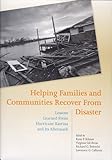Helping families and communities recover from disaster : lessons learned from Hurricane Katrina and its aftermath / edited by Ryan P. Kilmer ... [et al.].
Material type: TextPublication details: Washington, DC : American Psychological Association, c2010.Edition: 1st edDescription: xiv, 340 p. : ill. ; 26 cmISBN:
TextPublication details: Washington, DC : American Psychological Association, c2010.Edition: 1st edDescription: xiv, 340 p. : ill. ; 26 cmISBN: - 9781433805448
- 9781433805448 (print ed.)
- 1433805448 (print ed.)
- 363.348
APA ebook
IT Carlow ebook
Includes bibliographical references and index.
Supporting children post-Katrina : reflections on psychosocial interventions and guiding principles -- The caregiver-child relationship and children's adjustment post-Hurricane Katrina -- The effects of parenting behavior on children's mental health post-Hurricane Katrina : preliminary findings -- Family resilience and resiliency following Hurricane Katrina -- Consequences for classroom environments and school personnel : -- Evaluating Katrina's effect on schools and system response -- Service needs of children and families impacted by Hurricane Katrina -- Implications of major disaster for educators, administrators, and school-based mental health professionals -- Social and community responses : assessing relationships among environmental supports in child and caregiver adjustment post-Hurricane Katrina -- The roles of faith-based organizations after Hurricane Katrina -- The aftermath of Hurricane Katrina : mental health considerations and lessons learned -- Community resilience and wellness for the children exposed to Hurricane Katrina -- Lessons learned from Katrina and other devastating hurricanes : steps necessary for adequate preparedness, response, and intervention.
"On August 29, 2005, Hurricane Katrina made landfall along the Central Gulf Coast region of the United States. The storm and its aftermath resulted in the most severe, damaging, and costly natural and unnatural disaster in the nation's historyاas evidenced by the size of the region affected, the loss of life, the extensive destruction of property, and the thousands displaced. More than 2 years postdisaster, many families still lived in temporary housing and had limited access to basic services; in fact, many continue to struggle to meet basic needs. Furthermore, the mental health needs of many survivors remain largely unmetاand disproportionately so for marginalized, disenfranchised segments of the affected population. The magnitude of Hurricane Katrina and the associated shortcomings in disaster planning and relief interventions have provided mental health and social service professionals, as well as policymakers, with critical information for the improved handling of future disasters. The present volume examines key lessons learned and offers a blueprint for better meeting the needs of children, families, and communities postdisaster through well-timed, targeted responses and interventions. Broadly guided by a bioecological framework, it highlights significant issues in postdisaster work; considers the range of risks, resources, and factors related to postdisaster adaptation; emphasizes community-level provision of resources, services, and supports; and provides actionable recommendations and practical applications for future disaster preparedness, response, and recovery. The editors' and contributors' experiences with children, caregivers, educators, and practitioners in Louisiana and Mississippi lend a compassionate perspective to the analysis of research and further underscore the significance of the recommendations put forth"--Jacket. (PsycINFO Database Record (c) 2010 APA, all rights reserved).
Also issued in print.
Electronic reproduction. Washington, D.C. American Psychological Association 2010 Available via World Wide Web Access limited by licensing agreement s2010 dcunns
